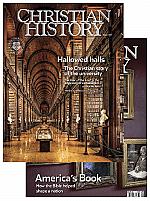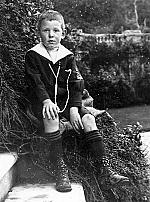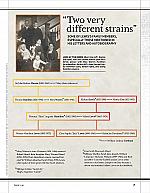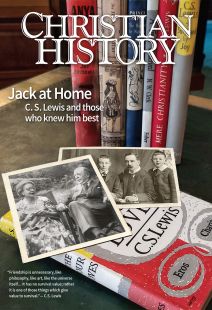Jack at home: did you know?
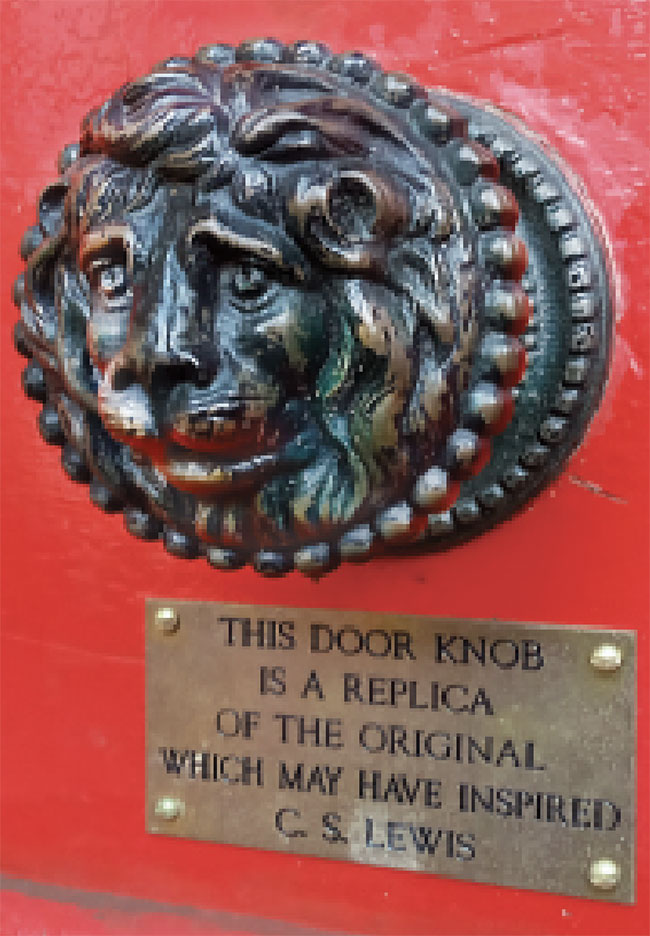
[Above: LION AT REST This doorknob graces the rectory of the church served by Lewis’s grandfather, John Hamilton.—Rectory Doorknob, St. Mark’s Dundela—MrHistorianDude / [CC BY-SA 4.0] Wikimedia]
No prunes for me
In his essay “On Three Ways of Writing for Children,” Lewis recalled announcing “I loathe prunes” very loudly in the dining room of a hotel. A little boy nearby announced just as loudly, “So do I.” Lewis evidenced similar empathy in writing to children—speaking about their daily lives, critiquing the writings they sent him, and discussing God. In a letter written the day before he died, he noted to one boy, “All the children who have written to me see at once who Aslan is, and grownups never do!”
The blue cow on the piano
Eric Routley (1917–1982), later a famous church musician and composer, was an undergraduate at Oxford during World War II and attended a Socratic Club meeting Lewis was chairing. There, Routley said, “students crowded into a room and sat on the floor or under the piano.” When one of the students asked during the discussion how one could prove anything, including whether there was a blue cow on the piano, Lewis responded, “Well, in what sense blue?”
The original media fast
Derek Brewer (1923–2008), a Chaucer scholar, studied under Lewis in the mid-1940s. Lewis once told Brewer he “lack[ed] pep,” but supported his later scholarship, serving as general editor for one of Brewer’s Chaucer editions. Brewer recalled that Lewis never read newspapers because, Lewis said, “Someone will always tell you if anything has happened.”
“Steiner says”
Daphne Olivier Harwood (1889–1950), first wife of Lewis’s friend Cecil Harwood (1898–1975), was actor Laurence Olivier’s (1907–1989) cousin. An Anthroposophist, she introduced both Harwood and Lewis’s friend Owen Barfield to this complex mystical philosophy founded by Rudoph Steiner (1861–1925).
Lewis once exclaimed in reaction to her criticism that he was making Christianity too authoritarian, “When you have heard half as many sentences beginning ‘Christianity teaches’ from me as I have heard ones beginning ‘Steiner says’ from you & Cecil & Owen & [another friend]—why then we’ll start talking about authoritarianism!” But he greatly admired them both, describing Harwood as “the sole Horatio known to me in this age of Hamlets.”
The pog and the fox
Lewis often visited Inkling George Sayer (1914–2005) and his wife, Moira (1913–1977), although he generally forgot to tell them what train he was coming on. Lewis and Sayer enjoyed hiking the countryside. Once they met a tired fox trying to escape a fox hunt, and Lewis sent the hunt the other way. Another time they encountered some pigs, and Lewis dubbed the most intelligent one “not a pig but the first pog. . . . The Pig and the Pog. That’s not a bad title. I wonder if I can write the story to go with it.”
Talking at breakfast
James Dundas-Grant (1896–1985) first met Lewis at Magdalen College in 1944, when Dundas-Grant was newly in charge of the University Naval Division. At breakfast he noticed “a baldish head” behind the magazine Punch:
There was a rustle of Punch, and I found a pair of merry, friendly eyes looking at me. “I say,” then in a whisper, “do you talk at breakfast?” “By training, no; by nature, yes,” I replied. Down went Punch. “Oh, good,” he said. “I’m Lewis.” “Not Screwtape?” I blurted out. “I’m afraid so; yes.”
Lewis and Dundas-Grant became friends. Dundas-Grant attended Inklings meetings. He recalled, “I found how much one learned just sitting and listening.”
Blessed pedestrians?
Clifford Morris (1914–?) saw Lewis from a unique perspective—as his chauffeur. Because Lewis couldn’t drive, he frequently used the car-hire firm Morris worked for, and they shared picnics, walks, and stops at inns with each other. Morris picked Lewis up from the hospital the night his wife, Joy, died.
One day someone crossed the road in front of them; Morris exclaimed in frustration, “Blessed pedestrians.” Lewis immediately began to question Morris’s theology: “You certainly didn’t hope that they were exceedingly happy now and that presently they will enjoy the bliss of the celestial realms!” Morris described Lewis as never talking religion, “except in the sense that a true Christian never talks anything else.” CH
Many of these anecdotes can be found in C. S. Lewis at the Breakfast Table, edited by James Como.
By the editors
[Christian History originally published this article in Christian History Issue #140 in 2021]
Next articles
"Two very different strains"
Some of Lewis's family members, especially those mentioned in his letters and autobiography
the editors and artist



